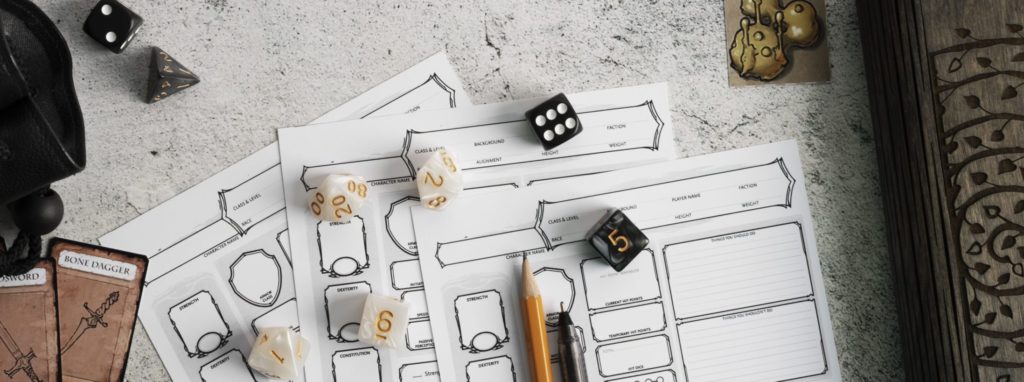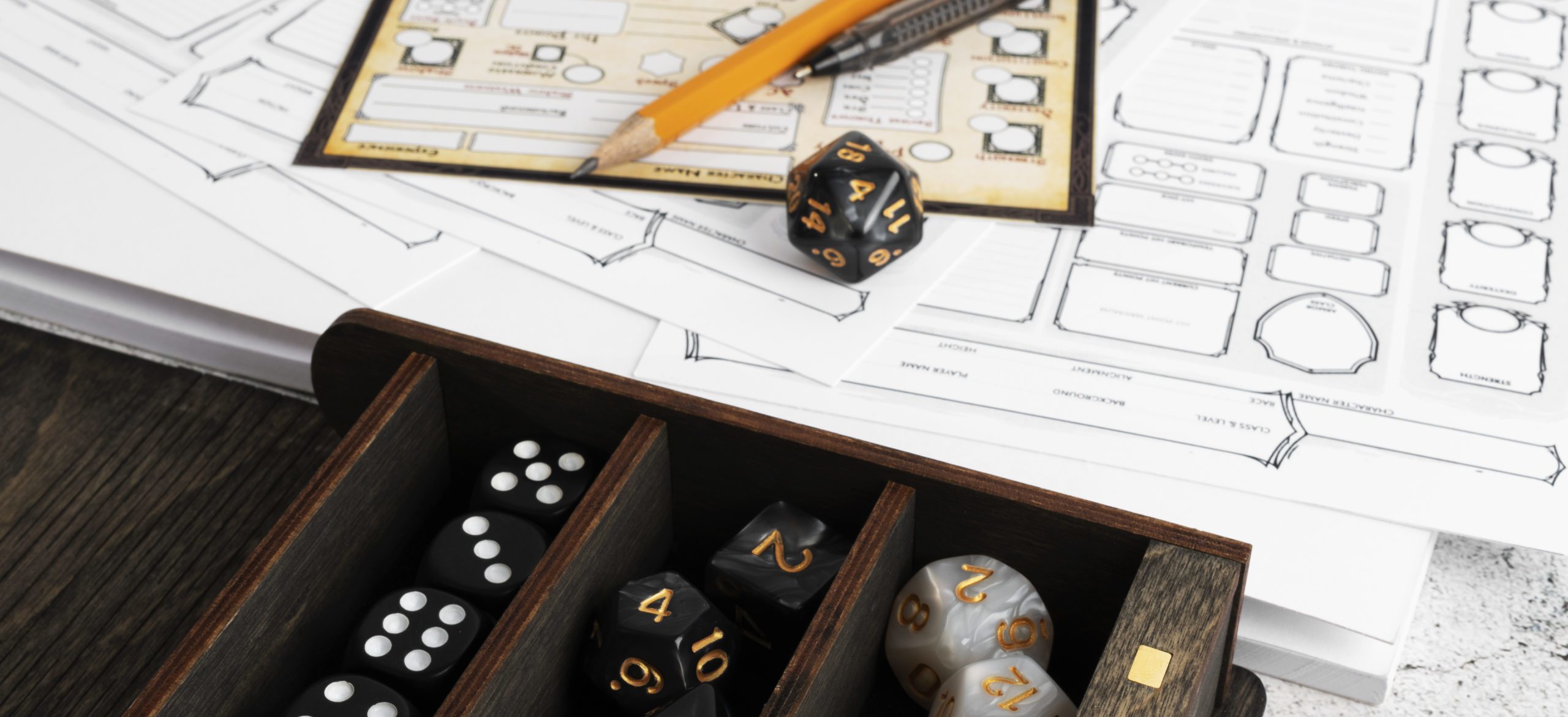D&D 5e Character Creation Guide
In this article, we’ll cover how to create player characters, commonly called PCs, in Dungeons & Dragons 5th edition (D&D 5E). We’ll cover the many facets of character creation in hopes of helping D&D Players get the most out of their characters and gameplay experience.
When it comes to character creation, there is a process to build them according to fifth edition (5E) rules, but there are so many different ways to develop who they are and what they’ll be able to accomplish during their adventures.
create DnD 5e player character
Character Sheet
The very first step is going to be tracking down a copy of a Dungeons & Dragons 5E character sheet. Here’s a link to a fillable PDF character sheet offered by Wizard of the Coast. Alternatively, there are online character builders that take all the content from the character sheet and store it online, and some also allow you to export and print the classic character sheet. D&D Beyond offers free online tools to build characters and develop an online inventory of Dungeons and Dragons sourcebooks.
These character sheets will capture your character’s key details, including name, class, sub-class, level, abilities, spells, ability scores, background, backstory, etc. We’ll go over these below, but for now, remember that the character sheet is where players record changes to their character and refer back to it when they need to understand what their character is capable of.

create DnD 5e player character
Character Concept
Before working through the character sheet, it’s best to have an image of who and what your Player Character will be. For example, it’s common to base PCs on popular superheroes and famous characters. This is helpful to give direction on what race and class are best and help you navigate the many character development options like skills, abilities, feats, variant rules, and authorized homebrew content.
We suggest talking with your Game Master (GM), also commonly called the Dungeon Master (DM), about your character concept. This is also a good chance to learn about the world in which your adventure will be played. This can be an important conversation to make sure that your character idea is appropriate for the setting and can also help the GM consider where your character fits in their storyline.
create DnD 5e player character
Character Level
Many characters are created at level 1, the lowest character level in 5E. However, not all characters will be made to play at level 1. Some may be creating a character to join an adventure or campaign partway through and their level will be set according to the rest of the party; others may be replacing a character that didn’t survive the last game session and is being created at the same level as the previous character; or the GM prefers to start characters at a higher level to suit the campaign. This is another question to ask the GM to make sure you have all the information to confidently build your character for their upcoming game.
There are two main approaches for when to level up PCs, the first is by accumulating experience points (XP) and the other is by milestone. Player characters accumulate experience points by defeating monsters, solving puzzles, completing questions, etc. Overall, as the party progresses through sessions and overcomes the GM’s obstacles, they acquire XP. The Player’s Handbook and Basic Rules contain a leveling table showing how much XP is required to progress from Level 1 to Level 20. Milestone leveling is entirely up to the discretion of the GM and typically aligns with quest completion or story milestones.
Each time a character goes up a level, he or she gains access to a few benefits, including more hit points with each level and occasionally an increase to the character’s proficiency bonus, ability score of choice or number of spells, and access to new spells or abilities. The character class description will have a table that shows the character progression from level 1 through 20. It’s also important to look through your character’s sub-class description as it’ll describe additional abilities gained at specific levels.
create DnD 5e player character
Class & Race Selection
The first step in defining your Player Character is with class and race selection. We often choose the PC’s class first since these have the biggest impact on the skills, abilities and overall gameplay options offered to the player.
Each race and its many sub-races has its own unique set of bonuses and special abilities. Players often consider races with Ability Score bonuses and abilities that will complement and support their PC’s build. There is no wrong choice when combining races and classes; some will prefer to focus on the mathematical bonuses to their PC’s gameplay, while others will make their choice for the story elements it brings together.
Have no idea where to start? Here’s a breakdown of the most popular classes according to D&D Beyond, and this is a link to their Class Guides to help get you started.

We can also tell you that Humans, Elves, and Half-Elves are among the most popular race choices when making player characters.
These are just some basics. There are easily hundreds of possible class/race combinations, and even more with each new sourcebook released.
create DnD 5e player character
Ability Scores
How to allocate Player Character’s ability scores (often called “Stats”) is important when creating a PC since they rarely change once assigned.
Each ability affects different aspects of the character with ability scores of 12 and higher offering benefits (up to +5 bonus) to the character and scores of 9 and lower giving them penalties (as low as a -5 penalty).
Your character’s abilities with a brief summary of their effects are:
- Strength (STR) represents the physical capacities of a character and directly impacts melee attack rolls, melee damage, skills of physical prowess, and carrying capacity.
- Dexterity (DEX) represents the character’s agility, speed, and accuracy. Dexterity directly impacts ranged attack rolls, ranged damage, armor class, initiative, and skills of nimbleness and finesse.
- Constitution (CON) represents the character’s endurance and fortitude. Constitution affects the character’s hit points (HP) and skills of concentration and endurance.
- Intelligence (INT), representing the character’s knowledge and reasoning. Intelligence affects the character’s arcane magic abilities as well as skills of knowledge, memory, and logic.
- Wisdom (WIS) represents the character’s understanding of the world, its creatures, and their place in the universe. Practically speaking, Wisdom affects the character’s divine magic abilities, defenses against many spell effects, and skills of communication and insight.
- Charisma (CHA) represents the character’s social grace and public perception. In application, Charisma impacts the character’s innate magical abilities along with their skills in convincing and manipulating others.

Each class description includes the most important and second most important ability score for that class. These are good choices for the major ability scores to invest in and the others you can allocate as you desire. That being said, advanced character builds may choose to prioritize different abilities but that is typically done for a specific reason and runs the risk of impacting gameplay and should be done with your GM’s blessing.
There are different ways to determine the scores to assign to each ability, such as:
- Standard Array, which offers set numbers to allocate to each of the abilities. The standard array is 15, 14, 13, 12, 10, 8 to be assigned as a base Ability Score by the player.
- Point Buy, offers players a set number of points spent on each ability to create a custom array. The Player’s Handbook (PHB) provides the number of points and ability score point cost needed to assign ability scores with this method.
- Your GM may also decide to adjust the number of points players have available to keep the party balanced and aligned with his game’s power level.
- Your GM may also decide to adjust the number of points players have available to keep the party balanced and aligned with his game’s power level.
- Rolling Dice, which allows players to roll at least 3d6 per ability to create a custom array.
- GM’s often have all kinds of house rules and limitations when using this method since it’s quite unpredictable.
It’s important to confirm with the GM if they use a specific approach to determining ability scores and if they have any house rules to keep in mind.
create DnD 5e player character
Skill & Tool Proficiencies
Once the class is chosen, the class description offers a list of skills and tool proficiencies available to the character. Skills in which you are proficient allow you to add your character’s proficiency bonus (based on the PC’s level) to the skill roll during gameplay. In other words, you have a better chance of succeeding with those skills.
One important difference between skills and tools is that a PC can often try a skill they aren’t proficient in, Athletics (STR) to jump for example. But with tools, a character must be proficient to even attempt using them. They must also have the tools at hand to attempt the skill check. For example, your character needs to know how to use thieve’s tools and have them in hand in order to attempt and pick a locked door or chest. It won’t be possible otherwise.
In the next section, we’ll cover the Player Character’s Background, which also provides a few additional skill or tool proficiencies. If these overlap with a selected skill from the class description go back to that list and pick another one instead.
Also, note that the skills are all affected by the character’s ability scores and the modifiers they provide. For example, Acrobatics (DEX) is affected by the Dexterity ability modifier, while Insight (WIS) is affected by the Wisdom ability modifier.
Knowing which abilities offer high modifiers is worth considering when selecting which skills to be proficient in. Some players will prioritize the skills with high ability modifiers to specialize in the skills and reliably succeed in higher difficulty skill checks. Others may prioritize skills with low modifiers to average their success across multiple skills. Lastly, some will choose skills based on the character’s personality and backstory without worrying about the ability modifiers. There’s no wrong choice, but these decisions will come up in the game when your character is confronted with a variety of skill challenges and roleplay opportunities.
create DnD 5e player character
Character Background & Backstory
A player character will have both a Background and a Backstory.
The DnD 5E Sourcebooks offer a wide variety of character backgrounds to choose from. Each background offers a broad description of your character’s upbringing and provides additional skill, tool, and language proficiencies, starting equipment, and a feature which is a special ability of sorts.
The background description also offers random tables for personality traits, ideals, bonds, and flaws. These are short descriptions outlining your character’s personality. If the tables don’t quite cover your character’s personality, we’d suggest writing your own but make sure you have something in each field (personality traits, ideals, bonds, and flaws) since these round out your character’s personality and help guide their roleplaying in-game.
The backstory on the other hand is left entirely up to you, the player, to fill in. It’s a chance to imagine the character’s childhood and upbringing. A few questions to ask yourself include:
- Did they come from a big city, a remote village, a secluded cabin, or elsewhere?
- Were they raised by their family?
- What was their family’s fate before your character began adventuring?
- What caused your character to begin the dangerous life of an adventurer?
- How did your character get involved in your GM’s plot hook and setting?
This is where you can really bring your character to life and understand their motivations. On the other hand, this can be daunting for a brand-new character and won’t have much of an impact on your gameplay. If you find the backstory overwhelming, we suggest leaving it blank and starting to fill it in after some gameplay as you’ve had a chance to try out your character around the game table and get a better sense of who they are as an individual.
create DnD 5e player character
Spells
Magical spells are a relatively complicated and enticing part of Dungeons & Dragon’s 5E gameplay. First off, not every player character will have access to spells, although most will have the chance to benefit from magical items and spell effects offered by scrolls and potions.
The DnD 5E spells are organized according to class-specific spell lists. Here they are in order:
- Bard Spells
- Cleric Spells
- Druid Spells
- Paladin Spells
- Ranger Spells
- Sorcerer Spells
- Warlock Spells, and
- Wizard Spells
Some sub-classes offer limited access to spells to one of the above spell lists or a selection among a short list of individual spells.
The character’s class and spellcasting ability modifier will also dictate how many spells you have available and how strong their effects will be. The class description will explain in detail your character’s spellcasting abilities.
Knowing which spells to choose and/or prepare is no small task since each class gains and casts spells differently. Regardless of the spellcasting class, it is important to understand the effects of the chosen spells to know what they offer your character and when it’s appropriate to use them. Spells are complicated and can be overwhelming for newer players. Many experienced players suggest new players avoid spellcasting classes for their first playthrough. This allows them to focus on learning the gameplay basics.
create DnD 5e player character
Starting Equipment
Selecting equipment for level 1 characters is pretty straightforward since the class description offers a few choices of weapons and equipment packs. Your character background will also add a few items to your inventory and provide starting gold pieces (gp).
To create a higher-level character, you’ll have to confirm with the GM how to handle starting equipment. They may provide you with a list of items to choose from or provide you with a sum of gold pieces to purchase your weapons, armor, and essential items. They may also provide you with a choice of magical items to begin with.

create DnD 5e player character
Other Key Fields
We’ve covered quite a few areas of the character creation process but have yet to cover these other important fields on the first page of the character sheet.
Saving Throws
A character’s defensive rolls against many environmental hazards and spell effects. Each saving throw is affected by its Ability Score and proficiencies offered by the Class description.
Initiative
A character’s reflexes to initiate action in a given situation, usually the beginning of combat. The character’s initiative is affected by their Dexterity ability modifier and specialized features or abilities.
Armor Class (AC)
The character’s armor class represents how difficult it is to hit the character with attacks. There are a number of ways to improve a character’s AC, which we’ve outlined below:
- Armor class is most heavily affected by the armor the character is wearing.
- You’ll also need to pay attention to your character’s armor proficiencies when choosing between light armor, medium armor, and heavy armor.
- Equipping a shield will also improve the armor class of characters that are proficient with them.
- The Dexterity ability modifier is also considered when calculating the character’s armor class but note that some armor will limit the Dexterity modifier.
- There are also spells that give characters a temporary bonus to their AC.
- These are important since spellcasting classes are notoriously squishy (easy to hit, and few hit points).
- Lastly, class features may allow you to add different ability modifiers to the character’s AC, like the Monk’s Unarmored Defense ability, which also allows you to include the character’s Wisdom ability modifier as long as the character is not wearing armor.
Hit Points
Hit Points represents how much damage a character can sustain before they succumb and must face death saving throws. A character’s health is first affected by their Hit Dice, which is assigned by their class. For example, the Barbarian is given an additional D12 to Hit Points with every level, while the Wizard is awarded an additional D6. In addition, a character’s Constitution ability modifier is added to the character’s maximum hit points each character level, which means it is important to make sure to have a Constitution ability score of 10 or higher to not receive a penalty to hit points!
Languages
The number of different languages known by the character is determined by their race and background in most cases. Feats and sub-class abilities can also offer the character additional languages. Like in real life, language proficiencies allow your character to read, write, speak, and understand various languages in the game. All characters are proficient with the Common language in order to allow all characters to communicate with one another in at least one language. However, your party may encounter foreign texts or mysterious dialects that they may not understand.
create DnD 5e player character
Wrapping Up
We’ve covered a lot of ground here, but we must admit that this only really captures the basics of character creation and builds. There’s still much to consider when looking at long-term characters and optimized builds. We’ll aim to come back with more details on advanced character building, but we’ll have to leave it here for now.
Thanks for reading through to the end. We hope that this was helpful and informational for you.
If you liked this, you should check out our 6 Best Dungeons & Dragons Tips for New Players.
If there are any Dungeons and Dragons 5e topics you would want to be covered in the next article, send us an email info@cultadventures.com or drop it in the comment section!
Cult Adventures is a team of creative, caring developers who create new, fresh Dungeons and Dragons 5e content. We make adventures and game supplements for those who seek fun, new innovative ways to play their favourite game!
Check out our Shop and support our growth!
create DnD 5e player character



0 Comments